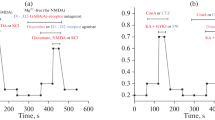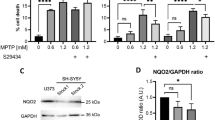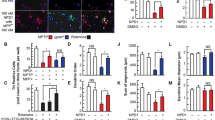Summary.
Dopamine agonists are an important therapeutic strategy in the treatment of Parkinson's disease. They postpone the necessity for and reduce the required dose of L-3,4-dihydroxyphenylalanine (L-DOPA) medication thus protecting against the development of motor complications and potential oxidative stress due to L-DOPA metabolism. In primary cultures from mouse mesencephalon we show that pergolide, a preferential D2 agonist enhanced the survival of healthy dopaminergic neurons at low concentrations of 0.001 μM. About 100 fold higher concentrations (0.1 μM) were necessary to partially reverse the toxic effects of 10 μM 1-methyl-4-phenylpyridinium (MPP+). Pergolide was equally effective in preventing the reduction of dopamine uptake induced by 200 μM L-DOPA. Furthermore, between 0.001–0.1 μM it also reduced lactate production thus promoting aerobic metabolism. The present findings suggest that pergolide protects dopaminergic neurons under conditions of elevated oxidative stress.
Similar content being viewed by others
Author information
Authors and Affiliations
Additional information
Received February 4, 2002; accepted February 21, 2002
Rights and permissions
About this article
Cite this article
Gille, G., Rausch, WD., Hung, ST. et al. Pergolide protects dopaminergic neurons in primary culture under stress conditions. J Neural Transm 109, 633–643 (2002). https://doi.org/10.1007/s007020200052
Issue Date:
DOI: https://doi.org/10.1007/s007020200052




